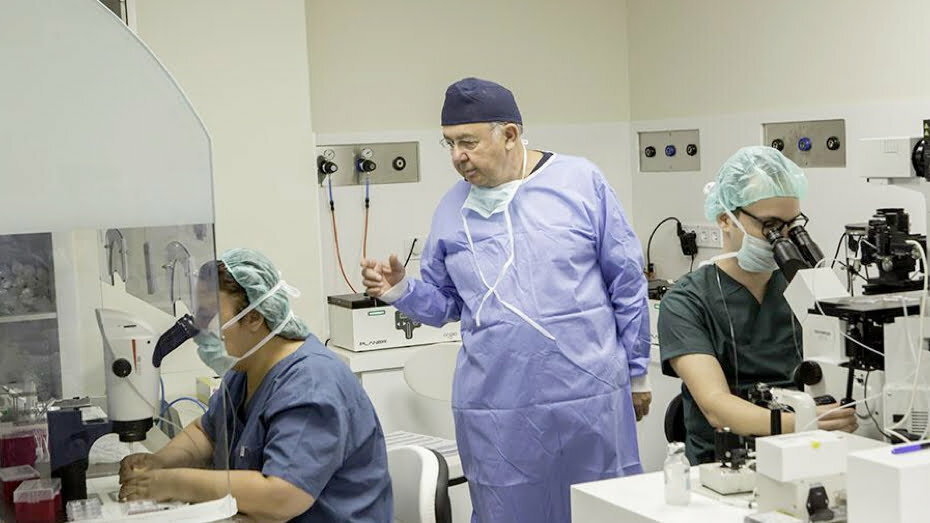Centrum Clinic IVF Team announced the first ROSI pregnancy in February 2019. This was actually just the tip of the iceberg. Because Prof. Dr. Recai PABUÇCU and his team went to training with Dr. TANAKA and his team from Japan, where the foundations of the ROSI technique were laid and which has the largest ROSI series in the world. At the end of this training process, the team came to Turkey and achieved the first pregnancies with the ROSI technique, which is a ray of hope for thousands of families…”
What is ROSI Technique?
The word ROSI is an abbreviation of the words “Round Spermatid Injection”. The first applications of the ROSI technique started in 1995. However, successful results were not obtained in the first applications. The ROSI technique was started to be performed again by Dr. Tanaka in Japan in 2009, and pregnancy was achieved with the method they developed. The ROSI technique has been the hope for men who have no sperm in the semen (azoospermia) and who cannot surgically extract sperm from the testicles.
In order to understand the ROSI technique and spermatids, it is necessary to understand the sperm production stages called spermatogenesis. In the testicle, there are main sperm cells within the sperm channels, the main sperm cells turn into mature sperm cells through different stages of development that last about 70-90 days. Initially, the main sperm cells have 46 chromosomes, and when these cells reach the spermatid stage, meiosis undergoes division and the number of chromosomes decreases to 23. Spermatids with 23 chromosomes are fertilized with 23 chromosomes, allowing to obtain normal embryos with a total of 46 chromosomes and to form a pregnancy.
ROSI is a technique applied to father-to-be who do not have mature sperm in the semen and who cannot obtain mature sperm by Micro-TESE method.
To Whom Is ROSI Technique Applied?
ROSI technique is applied to patients with azoospermia (non-obstructive azoospermia) who are not due to obstruction. ROSI technique is applied to father-to-be who does not have mature sperm in the semen and who does not have mature sperm with Micro-TESE method but has spermatids. Before starting ROSI treatment, the hormone values of the father-to-be, testicular ultrasound, genetic tests and special spermogram test we perform in our clinic where we can determine the stage of sperm development are examined.
ROSI treatment can be started immediately after the evaluation, or in some cases, hormone/medication therapy is applied for 3 or 6 months before the treatment, hormone values and spermogram can be monitored at regular intervals.
Which cells are used during the ROSI method?
In the ROSI technique, haploid sperm cells, ie sperm cells with 23 chromosomes after meiosis division, are used. ROSI technique is applied by using cells specified as Sa, Sb1, Sb2, Sc in the image.
In the image, Sd1 and Sd2 with the sperm cells specified as standard IVF ICSI method is applied. The choice of spermatid requires experience and knowledge. Our embryologists, who received training in spermatid selection in Japan in the ROSI technique, have been performing this procedure successfully for 4 years.
ROSI Technique process
ROSI treatment is started after the urology and gynecology examination of the spouses, if there is no obstacle to the treatment, the woman is started with egg stimulation needles on the 2nd day of menstruation like standard IVF treatment. On the day of egg collection, Micro TESE is performed on the male. Sperm cells taken with micro-TESE are examined in the laboratory. Our first goal here is to find mature sperm cells. After hours of examination by our experienced andrologists, mature sperms, if any, and round and elongated spermatids are collected if there are no mature sperm.
Some of the collected spermatids are frozen for later use in ROSI application. The most important point here is to distinguish round spermatids with 23 chromosomes from sperm cells with other 46 chromosomes. The oocytes/eggs obtained from the woman are stimulated by a method called piezoelectrometric and made ready to interact with the sperm and then the round/elongated spermatids are placed into the egg by microinjection method. Fertilization occurs approximately 17-24 hours after the microinjection procedure.
Embryo (fertilized egg) development is followed for the next 3 to 5 days and the best quality embryo/embryos is transferred to the mother’s womb. The remaining embryos are frozen. With the completion of the embryo transfer process, it is waited for about twelve days for the pregnancy to occur. With the ROSI technique, the pregnancy process generally continues the same as normal pregnancy. In this process, mothers-to-be should pay attention to their nutrition, should not go beyond the recommendations given by the doctor, and should definitely consult the doctor’s advice in cases where medication should be taken. In case of no pregnancy, ROSI can be performed again by freezing embryo transfer or frozen spermatids thawed and collecting eggs from the mother candidate in the following months.
Success Rate of ROSI Technique
The success rate of the ROSI technique is one of the most frequent questions. The success rate of the ROSI technique is low compared to standard IVF treatment. The success rate of the ROSI technique is observed between 7-8%. However, day by day, new studies in this field and the development of the methods applied contribute to the increase in the success rate of the treatment.
There are many factors that affect the success of the Rose technique. The age of the mother and father-to-be, hormone values, ovarian reserve of the mother-to-be, genetic status of the father-to-be are the factors affecting the success rate. For this reason, before starting ROSI treatment in our clinic, all factors are evaluated by our specialists and more clear information is given about the success rate.
Success rates in ROSI Technique are increasing every day. Turkey’s first baby born with the ROSI was born at Centrum Clinic. In addition, our clinic has the highest ROSI pregnancy and birth rate in Turkey.
Note: ROSI technique treatment varies according to the person, please consult our expert consultants.


